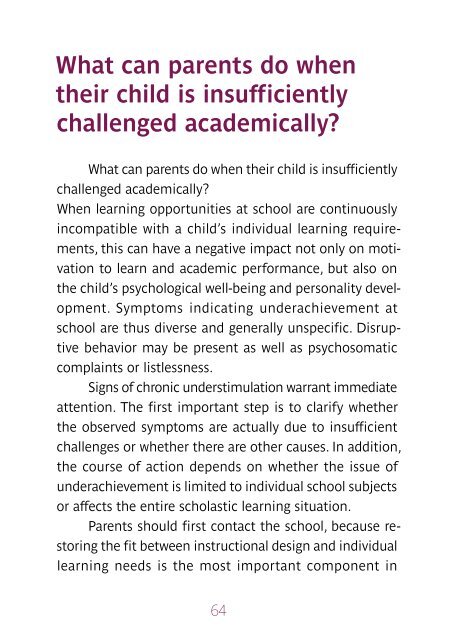FAQS: Frequently asked questions about giftedness
The Karg Foundation receives a lot of questions on the subject of giftedness—FAQs (Frequently Asked Questions)—far more often indeed than it did ten years ago. And this is a good thing! Many people involved in the educational processes of children have come to realize that giftedness can also be a fundamental personality trait of children and adolescents. The Karg Foundation wants to answer the questions you may have not only as educational and psychological professionals in educational institutions or working as educational providers, policy makers, or in training and further education institutes, but as parents and gifted people also: What is giftedness? How can it be identified? Who can provide advise for gifted children and their families? How can they be supported in the best possible way?
The Karg Foundation receives a lot of questions on the subject of giftedness—FAQs (Frequently Asked Questions)—far more often indeed than it did ten years ago. And this is a good thing! Many people involved in the educational processes of children have come to realize that giftedness can also be a fundamental personality trait of children and adolescents.
The Karg Foundation wants to answer the questions you may have not only as educational and psychological professionals in educational institutions or working as educational providers, policy makers, or in training and further education institutes, but as parents and gifted people also: What is giftedness? How can it be identified? Who can provide advise for gifted children and their families? How can they be supported in the best possible way?
Create successful ePaper yourself
Turn your PDF publications into a flip-book with our unique Google optimized e-Paper software.
What can parents do when<br />
their child is insufficiently<br />
challenged academically?<br />
What can parents do when their child is insufficiently<br />
challenged academically?<br />
When learning opportunities at school are continuously<br />
incompatible with a child’s individual learning requirements,<br />
this can have a negative impact not only on motivation<br />
to learn and academic performance, but also on<br />
the child’s psychological well-being and personality development.<br />
Symptoms indicating underachievement at<br />
school are thus diverse and generally unspecific. Disruptive<br />
behavior may be present as well as psychosomatic<br />
complaints or listlessness.<br />
Signs of chronic understimulation warrant immediate<br />
attention. The first important step is to clarify whether<br />
the observed symptoms are actually due to insufficient<br />
challenges or whether there are other causes. In addition,<br />
the course of action depends on whether the issue of<br />
underachievement is limited to individual school subjects<br />
or affects the entire scholastic learning situation.<br />
Parents should first contact the school, because restoring<br />
the fit between instructional design and individual<br />
learning needs is the most important component in<br />
ending underachievement. By involving the child and his<br />
or her teacher, the aim is to determine the best ways to<br />
support the child’s learning at his or her level of ability<br />
and to provide individualized support.<br />
In some cases, it is helpful to contact a counseling<br />
(e.g., school psychology) center. This is particularly advisable<br />
in cases where the child is experiencing significant<br />
distress and his or her underachievement is not limited<br />
to isolated school subjects. Analyzing the current situation<br />
and prior history can then help to mutually develop the<br />
appropriate interventions. Moreover, the child, parents and,<br />
if necessary, the school can be supported in implementing<br />
the agreed-upon actions. The counseling center can support<br />
the child in learning self-regulated learning techniques,<br />
for example, or it can accompany the decisionmaking<br />
process when contemplating whether to skip a<br />
grade level or change schools. Schools can also turn to<br />
specialized counseling centers for help.<br />
64<br />
65
















